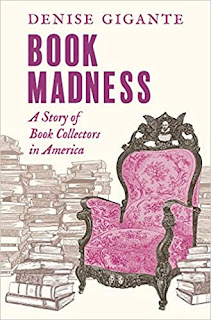 The Keats Brothers: The Life of John and George and Taste: A Literary History.
The Keats Brothers: The Life of John and George and Taste: A Literary History.
Gigante applied the Page 99 Test to her new book, Book Madness: A Story of Book Collectors in America, and reported the following:
If you open to page 99 of Book Madness, you’ll see at the top of the page a beautiful softtone engraving of the Croton Fountain bubbling up in the center of what used to be City Hall Park across from the Astor Hotel in downtown Manhattan. The exuberance of the water is spectacular, rising up to five times the height of the few couples milling about it the American belated Regency clothing style of 1845. The fountain is no longer there, the hotel is no longer there, and the park is no longer what it was. It’s a snapshot of a moment in time when a certain group of people—protagonists and actors in this book—had great aspirations for amplifying the cultural grandeur of the new country on classical European standards.Learn more about Book Madness at the Yale University Press website.
The paragraph of page 99 begins, “Truth be told, Strong did not know the number of square feet of the home rising up behind him, but he was going for rhythm rather than accuracy, keeping Coleridge’s iambic dimeter (“So twice five miles”) with his “So x square feet.” It is an analysis of a poem on the previous page by George Templeton Strong, a well-known diarist and bibliomaniac who chronicled the life of the city in the 1840s and beyond. Strong was having a new house built on Greenwich Street, which he celebrates in a playful spoof of Samuel Taylor Coleridge’s poem “Kubla Khan,” which describes a magical pleasure dome with caves of ice rising up before an inspired poet.
Money from John Jacob Astor, then the richest man in America who built the most spectacular hotel in the New World (behind the fountain), was used by another bibliomaniac in this story to build the Astor Library, the forerunner of the New York Public (formed through a merger of the Astor and Lenox Libraries in 1895). The wealthy bibliomaniac James Lenox was the top book collector in America. I would say that page 99 includes a number of interconnected threads, delivering a lot of American cultural history in the form of (on this page) a poetry analysis. I would say the Page 99 Test works, for the form of the book is what I am calling an associational literary history—an experiment in historical narrative and the story of American book love, passion, madness.
My Book, The Movie: The Keats Brothers.
The Page 99 Test: The Keats Brothers.
--Marshal Zeringue



